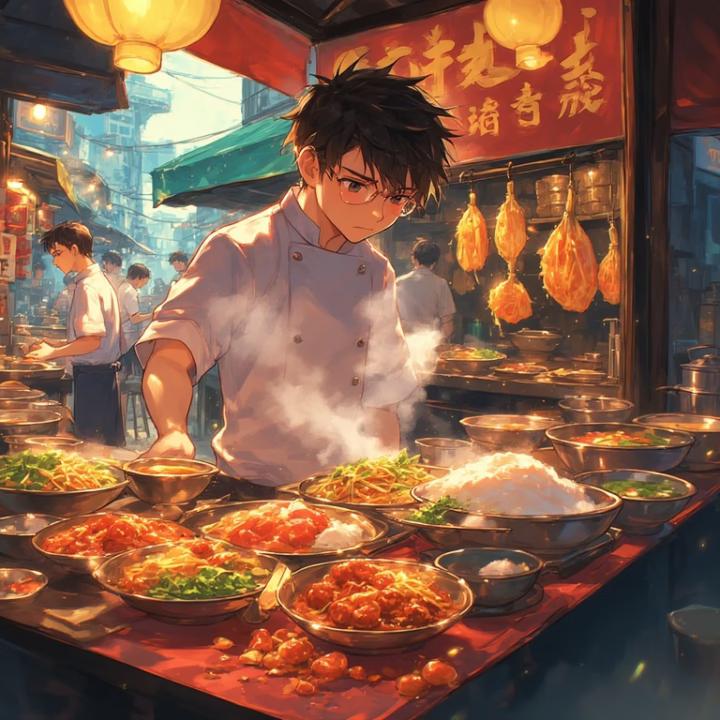
Chapter One: The Taste That Remembers
The sea breeze carried salt and sizzle as the last of the tourists drifted away from Gurney Drive, bellies full, cameras spent. Neon signs blinked like tired eyes—Hokkien Mee, Chendol King, Ah Leng Fried Oyster Omelette—their colors smearing across the wet pavement after a brief evening rain.
Eddy wiped sweat from his brow with the back of his forearm, the motion automatic after a long shift. He wasn’t cooking fine dining anymore. No tweezers, no foam, no plating that looked like a crime scene. Just wok hei, blistering heat, and the relentless rhythm of stir-fry.
He was back.
Back in Penang.
Back at Uncle Fatt’s Char Kway Teow, the stall his Ah Ma used to visit every morning with a thermos of homemade ginger tea.
Back to the place where he’d learned to crack an egg with one hand and balance a wok with the other.
And yet, something felt… missing.
“Still cooking like a Singapore boy,” Uncle Fatt had said that morning, shaking his head. “Too clean. Too careful. Food should fight you a little.”
Eddy hadn’t answered. He’d just nodded, ashamed.
Now, alone in the quiet, he scraped the last of the oil from the wok, the scent of lard and chives clinging to his clothes. He was about to toss the banana leaf lining the prep table when he saw it.
Tucked beneath the edge, half-hidden: a small, folded parcel.
Fresh.
He lifted it. The leaf was warm.
Inside, a single kuih kosui—the soft, steamed rice cake his Ah Ma used to make on rainy afternoons, pink on the outside, golden within. But this one was different. The center wasn’t the usual gula melaka. It was dark. Almost black.
He took a bite.
And the world stopped.
Smoky. Deep. Earthy. A flavor that didn’t just hit his tongue—it unlocked something. A memory: Ah Ma’s kitchen, the monsoon drumming on the roof, her voice humming an old Hokkien lullaby as she stirred a pot of something thick and fragrant. “This is the taste of patience, Eddy,” she’d said. “Not time. Patience.”
But that dish had been lost. A family recipe, gone when she passed.
How did this have that taste?
On the inside of the banana leaf, three words in charcoal:
“Follow the Taste.”
A breeze curled through the empty lot. The streetlights flickered.
And from three stalls down, the scent of belacan bloomed in oil—though all the stalls were closed.
Chapter Two: The First Clue in Satay Smoke
Eddy didn’t sleep that night.
He stared at the ceiling of his tiny rented room above a kopitiam, the taste still on his tongue, the words echoing in his skull. Follow the taste.
Was it a prank? A test? A ghost?
By midnight, he was back at Gurney Drive.
And the city was different.
Quieter, yes. But not empty.
A faint glow pulsed from the Satay King stall—shuttered, padlocked, yet smoke curled from its chimney. The scent of peanut sauce, grilled lamb, and something else—a hint of tamarind and star anise, just like Ah Ma used to mix.
No one was there.
But on the counter: a single skewer.
Three pieces of meat. Perfectly charred.
Eddy picked it up. As he did, a whisper passed through the air—like the rustle of banana leaves.
He bit.
And remembered.
Not just the flavor.
The day.
He was ten. Ah Ma had taken him to a hidden satay stall behind Komtar, run by a silent man with one eye and hands like tree roots. “He doesn’t speak,” she’d said. “But his food sings.”
That night, she’d taught Eddy the secret: “The sauce must be stirred counterclockwise, like the wind before a storm. Clockwise, and the soul leaks out.”
He’d forgotten.
Until now.
At the base of the skewer, carved into the bamboo: a tiny symbol—a wok with a star above it.
And beneath it, a date: Next full moon. 12:30 AM. Gurney Drive. The Feast Remembers.
Chapter Three: The Map in the Mango
The next clue came three nights later.
Eddy had been searching—old hawker registries, maps, even asking retired stall owners. No one remembered the one-eyed satay master.
But at 12:17 AM, he found the Rojak Stall glowing.
The vendor’s cart was covered in a tarp, but the scale was out, the knives laid in a neat row. On the cutting board: a half-prepared rojak.
Pineapple. Cucumber. Bean sprouts.
And one piece of candied mango—etched with fine lines.
Eddy lifted it.
It was a map.
Not of Penang. Of memory.
Twisting alleyways. Hidden courtyards. A temple with a cracked bell. A hawker stall with no sign, only a red lantern.
And at its center: a single word in faded ink.
“Ah Ma.”
His breath caught.
That was her stall. The one she’d run for twenty years before illness took her. The one no one knew the location of—because it moved.
She’d been part of something.
And now, so was he.
Chapter Four: The Feast of the Forgotten
On the night of the full moon, Eddy stood at Gurney Drive, heart pounding.
12:30 AM.
The air shimmered.
One by one, the closed stalls awoke.
Steam rose from unseen woks.
Lanterns flickered to life in colors that didn’t exist—deep indigo, molten gold, the green of monsoon leaves.
And from every direction, the scent of food—layered, ancient, alive.
He walked the path from the mango map.
Past the Nasi Kandar stall where the rice steamed without fire.
Past the Cendol cart where the coconut milk flowed like liquid moonlight.
Past the Hokkien Mee station where the prawns danced in the wok, though no hand stirred them.
And there, in the center of the drive, where the tarmac met the sea breeze, stood a long table.
Wooden. Worn. Set with banana leaf plates, clay bowls, and chopsticks of rosewood.
And seated—ghosts.
Chefs in stained aprons, old men with missing teeth, women with buns of silver hair, their eyes bright with fire.
And at the head of the table—
Ah Ma.
She looked exactly as he remembered. Blue batik dress. Hair in a tight bun. A wooden spoon in her hand.
She smiled.
“You came,” she said. Her voice was real. Warm. Like soup on a cold night.
“Am I… dreaming?” Eddy whispered.
“No,” she said. “You’re remembering. That’s harder.”
One of the elders—a man with a scar across his cheek—spoke. “Every ten years, the Midnight Feast calls a new Taste Keeper. One who can carry the soul of our food into the world. Not for fame. Not for money. For truth.”
“And you,” Ah Ma said, “have been tasting your way back to us.”
Eddy’s eyes burned. “I thought I’d lost you.”
“You didn’t,” she said. “You just forgot how to listen.”
Chapter Five: The Dish That Honors
“To be the Taste Keeper,” said the scarred man, “you must cook one dish. Not to impress. Not to win. To remember.”
Eddy looked around. No ingredients. No stove.
Then Ah Ma handed him a single banana leaf.
“Use what you carry,” she said.
He closed his eyes.
And reached into memory.
The smell of dawn oil heating in a wok.
The sound of Ah Ma singing as she pounded chilies.
The way she’d always save the first bite for him.
He thought of the kuih. The satay. The rojak.
And he knew.
He began.
With invisible hands, he pounded chilies, shallots, garlic.
He heated a phantom wok.
He added prawns—imagined, but real in scent.
Fried them in lard.
Tossed in noodles.
A splash of dark soy.
A pinch of sugar.
A drizzle of Ah Ma’s secret spice blend—five parts star anise, two cinnamon, one clove, and the ash of a burned letter.
Then, the final touch: a single egg, cracked with one hand.
He plated it on the leaf.
And when he opened his eyes—
There it was.
Char kway teow.
But not just any.
Ah Ma’s.
The first bite he ever had.
The last she ever made.
The Taste Keeper’s Dish.
The elders bowed their heads.
Ah Ma wept.
“You’ve earned it,” she said. “The lantern. The stall. The duty.”
Epilogue: The Lantern That Glows
A month later, a new stall appeared on the edge of Gurney Drive.
No sign. No menu.
Just a red lantern that glowed only on the last Friday of each month, at 12:30 AM.
Locals called it The Remembered Wok.
Tourists never found it.
But those who listened—who smelled the wok hei on the wind, who followed the scent of burnt sugar and memory—sometimes saw a young chef cooking alone.
And if you approached with an empty stomach and a quiet heart, he might serve you a plate.
No charge.
Just a whisper:
“Follow the taste.”
And if you were very still, very lucky… you might see an old woman in a batik dress, smiling from the steam, lifting a wooden spoon in salute.
Because the feast never ends.
It only waits.
For the next one who remembers.
THE END
For everyone who’s ever tasted a meal and seen a memory.
For the hawkers who feed our souls as much as our hunger.
And for the truth that some recipes are not written—they are lived, lost, and found again, one bite at a time.










